‘Mandy’ director Panos Cosmatos wants to direct ‘Doctor Who’ because of these classic villains (exclusive)
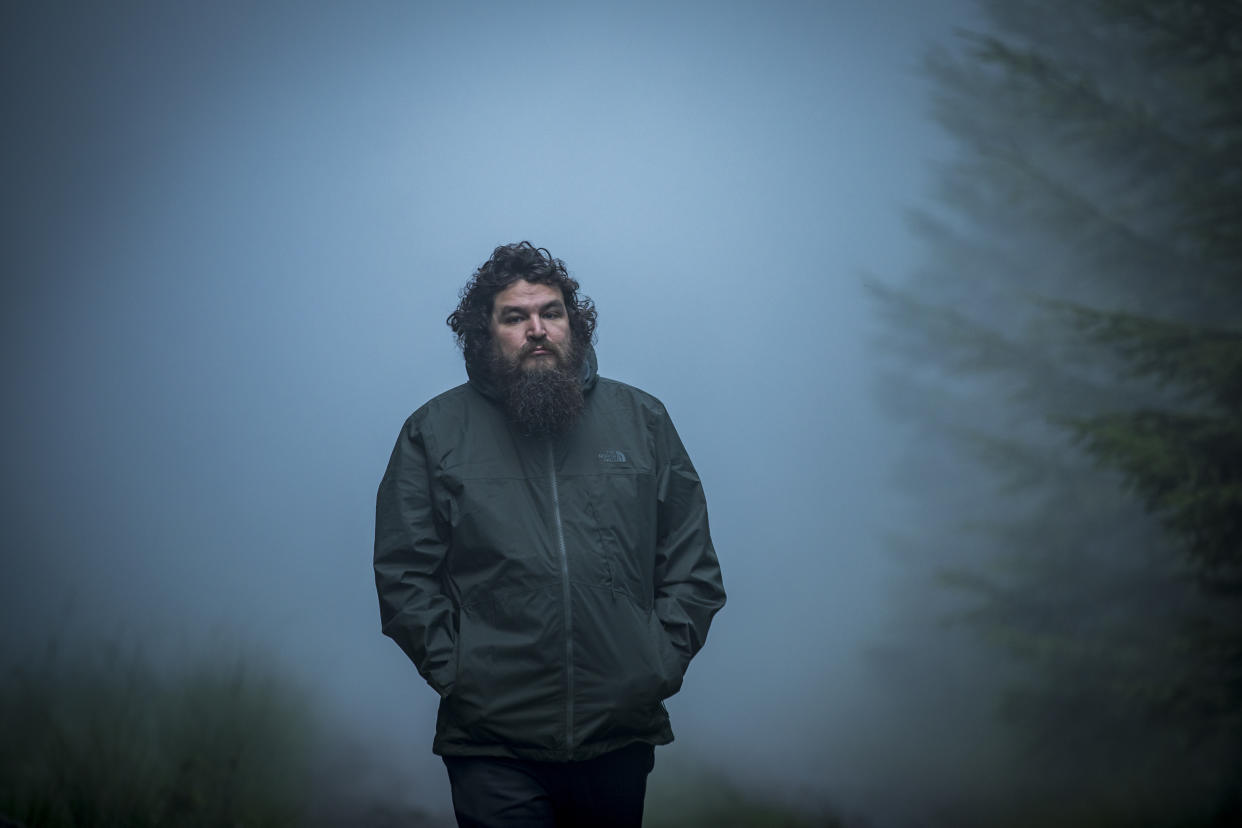
Mandy, the intense and emotional revenge flick starring Nicolas Cage at his best, is one of the most original horror movies to scream into cinemas since Ben Wheatley’s Kill List.
Of course, Wheatley went on to direct Doctor Who, and that’s something Mandy director Panos Cosmatos would also be up for. Mainly because of a disturbing memory of watching the British series when he was younger.
“I don’t have an encyclopedic knowledge of Doctor Who, but there was an episode I saw when I was a kid, where Doctor Who was in this castle and he was peering through a weird portal and he saw a man wearing a suit of armour,” Panos told Yahoo Movies UK.
“He had a helmet shaped like a thimble, and he lifted it off and his head was bald and shaped like the helmet on the inside – like a thumb! This thing haunts me, man, thumbhead!”
We sat down with Panos to discuss the brilliant Mandy, working with Nic Cage and creating his own VHS cinematic universe.
Yahoo Movies UK: When we first saw this film, it was a special screening on our own – so we had a whole cinema to myself…
Panos Cosmatos: Nice.
So, last night was our first screening with a crowd, and there were two moments that actually made us cry when we saw it on our own, that got laughs in the room…
Interesting, that’s surprising.
And they were both moments of extreme emotion – the bathroom scene, and there’s a shot at the end that felt very powerful to me. Why do you think people laugh at those extreme moments, and how do you feel about that?
I think if they see their own lives in it, then they don’t laugh. But if they go in looking at it as a freak show, or they’re primed to watching something that’s funny or crazy, then that’s what they’re expecting. I hope and suspect that if they watch it again that the emotion will start to hit them.
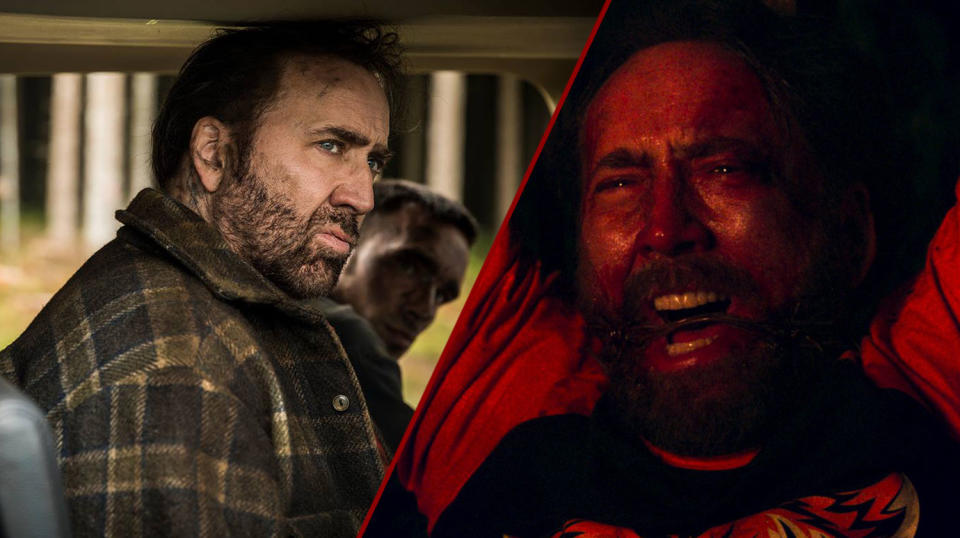
I know that a friend of mine who’d seen the film twice before was struck by a lot of emotions the last time, which surprised her. This time she found it an incredibly emotional experience.
I think there’s a lot of raw pain in the movie and I think maybe people aren’t expecting that. The beautiful thing about movies is that they don’t change, you change – and something that doesn’t affect you at all can become incredibly powerful later in your life if you see it in a different context.
And I wonder if there’s a connection to people’s desire to turn Nic Cage into a meme…
I suppose that’s inevitable, and it’s driving people to see the movie and that’s good, but I’m hoping that the movie will have a long enough life that people will discover more and more facets as they watch it over and over.
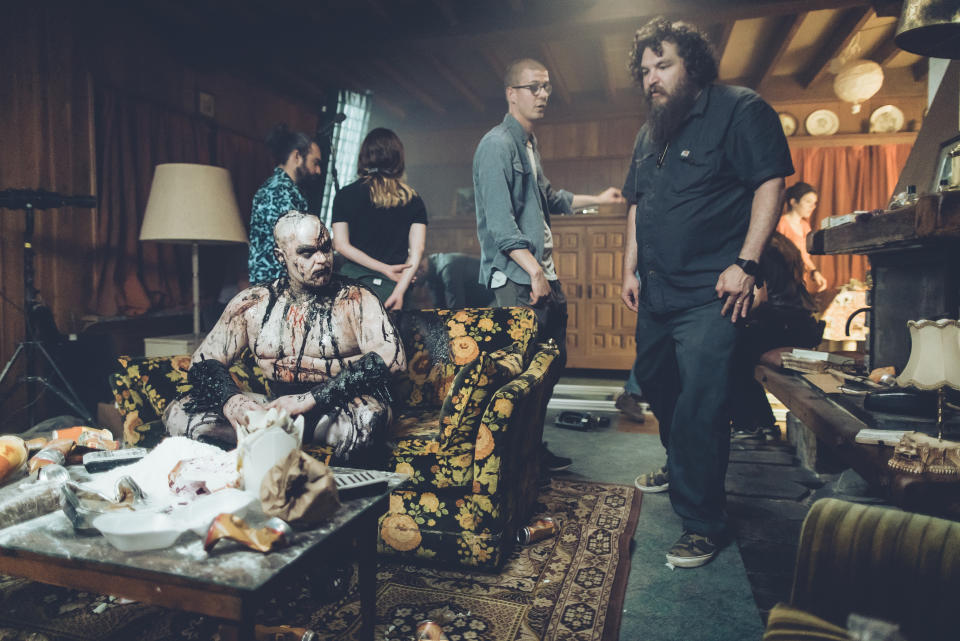
Both of your films are set in a mythological 1983, and that’s the same year you first went to Video Attic, is that right?
It wasn’t the first video store I’d been to, but I remember it was the first video store where I wandered into the horror section and started looking at these boxes, it was our main video store for a while. It was the first time I looked at the Videodrome box and stuff like that.
So are you creating your own VHS cinematic universe? Are you filling your own video store?
[laughs] I don’t know, maybe – I kind of like that. Definitely for these two films, that was the core inspiration for the style of them. I like the idea of filling a video store with them – but I don’t like the idea of the hell I’d have to go through to make that happen [laughs].
You showed Nic Cage Friday The 13th VII and there’s a moment in the film where he’s homaging it – what conversations did you have about it, and was it a first-time watch for him, because I know he’s a horror fan…
It was a first time watch for him, I don’t think he’s seen many of the Friday The 13th films so it was new to him.
I like that one because it’s a hybrid movie – it’s Carrie meets Friday The 13th, so I thought that would be an interesting one for him to see, because it’s a little bit more in line, in a way, with what I’m trying to do, where lots of different genres get hybrided together.
I wanted him to see Jason in a stranger context than normal.
Both of your movies are about uncontrolled ego. How do you feel about your own ego? Have you thought about how to control it, because this movie is going to be a turning point.
A big part of ego is self-image, and I think that’s the dangerous thing – when people have a delusional or an inflated self-image that doesn’t jibe with reality.
I think men tend to be like that, it makes them stubborn, and they refuse to change their lives or see themselves in a negative way, it’s too painful for them. I don’t think of myself as having an ego problem. I think of myself as having the opposite, I’m extremely anxiety-ridden, neurotic and insecure.
When it comes to trying to get movies made, I feel very passionately and strongly about things I’m trying to get made, so when I’m in those situations I can try to convince people that it’s a good idea to give me money.
But other than that I’ve never felt like an egoistic person, really. But there were times when my male self-image got in the way of being a better person.
Nic Cage’s ego is fascinating to me, he seems so free as a performer, almost ego-free. Is that what makes him special do you think?
I think what’s interesting about him to me is that he sees performance as an artistic expression. It’s not a pedantic approach where we’re trying to create a realistic portrayal of something. He’s aware of the concept that he can be baroque, that he can be stylised.
It was one of the reasons ultimately I thought it would work with him playing Red, if I could maintain an organic feeling that this was coming out of something real that this character was feeling, that we could go to some very baroque and expressionistic levels of performance.
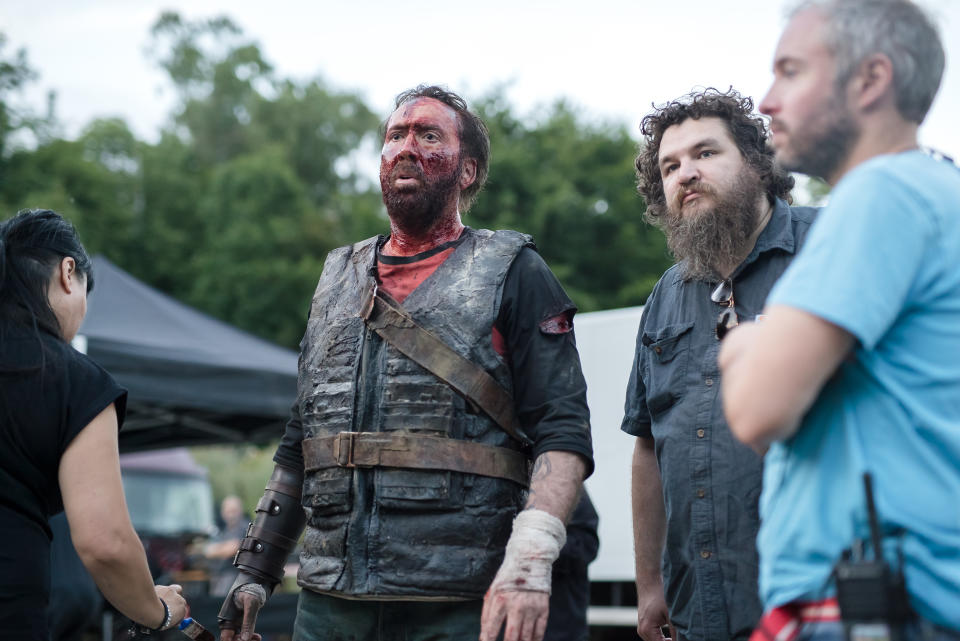
Nic Cage is influenced by silent cinema, are you? There are so many moments in Mandy that express so much through just the image.
I’ve never been a big silent cinema fan, I tend to fall asleep during them, sadly. But I do very much like the idea of trying to tell everything in the film with image and sound, and not depend too much on dialogue. There’s a mythical robustness to that, you know? There’s way more talking in this film than in the first one, but they’re monologues and there’s something very trance-like about a monologue.
You mentioned Carrie, are you a big Brian De Palma fan? I feel like that’s a film you could watch with the sound off and still know exactly what’s happening.
Right, yeah. He always appealed to me in that sense. That it was so heavily visually and tonally driven, and musically driven. And George Miller’s The Road Warrior growing up, there’s barely any talking in that film and it’s so propulsive and so captivating.
Watching that film so many times, there’s little moments between characters where they’re looking at each other and it says a lot – in the middle of some crazy scene, they look at each other and there’s a moment of connection between them, and that always struck me.
This might seem like a strange question, but did you play with action figures a lot when you were a kid?
Oh yeah. It would bother me when I played with other kids and they would smash them together, because I had a more detailed idea in my head. I would move them in slow-motion, because every movement was important. These actions were happening in real time but I would move them in slow motion.
During my obsession with The Road Warrior – I had it on Beta, I’d taped it from cable – I basically converted all my GI Joe figures into post-apocalyptic versions, and just use them for that [laughs].
There’s a fan theory that the second half of the film is possessed by Mandy’s spirit. Even though there are fantasy elements in the first half of the film, they get more intense in the second half.
I like that interpretation [smiles].
What was the germ of the idea that inspired Mandy, and can you talk about the writing process?
The germ of it was I watched all of the Death Wish movies in a row for some crazy reason one day. When you watch all of the films in a series, or a whole bunch of movies in one genre in a sitting, it gives you room to dwell on the mechanics of that genre, and what you like about it, what you don’t like about it, what you could do with it.
And I came to this thought of making a revenge movie that orbited around the essence of the person being avenged, that was a love song about them in a way, or an album.
I saw the King Diamond album Melissa the other day, and I wondered if I subconsciously saw that at some point and it manifested.
So that was the core idea, and as I started delving into that setting and the aspects of revenge, and it started to feel like a barbarian movie in a sense, and I wanted to be able to enhance those aspects of it – and all the pieces started to fall into place after that.
And you collaborated with a writing partner, how did that work?
I started writing Mandy as I was doing Beyond The Black Rainbow, but then it was possible to make Black Rainbow so I went off and did that, when that was all complete, I went back to working on Mandy again and realised I did not want to go back into that isolated existence of being alone in a room.
It had been a pretty intense emotional experience writing Black Rainbow, so I wanted the experience to be a more joyful and creative one, with another person where we could spitball and talk and if I didn’t I didn’t feel like writing a scene, he could do a pass on it and I could rewrite it and vice versa. I just wanted it to be a more playful experience.
There’s that myth that you can play The Dark Side Of The Moon alongside The Wizard Of Oz – would you ever make a movie that someone could play an album alongside? I feel like if anyone’s going to do it, it’s going to be you.
Well… [long pause]… Yeah, I like that idea a lot [laughs]. Now you’ve really got me thinking about that.
There’s actually a song that could be played over the last part of the film that could fit perfectly to it.
Can you reveal what that is, or do you want to keep it a secret?
I can’t. But I will, and when I do I’ll reveal it to you – but I’m not ready to reveal it yet.
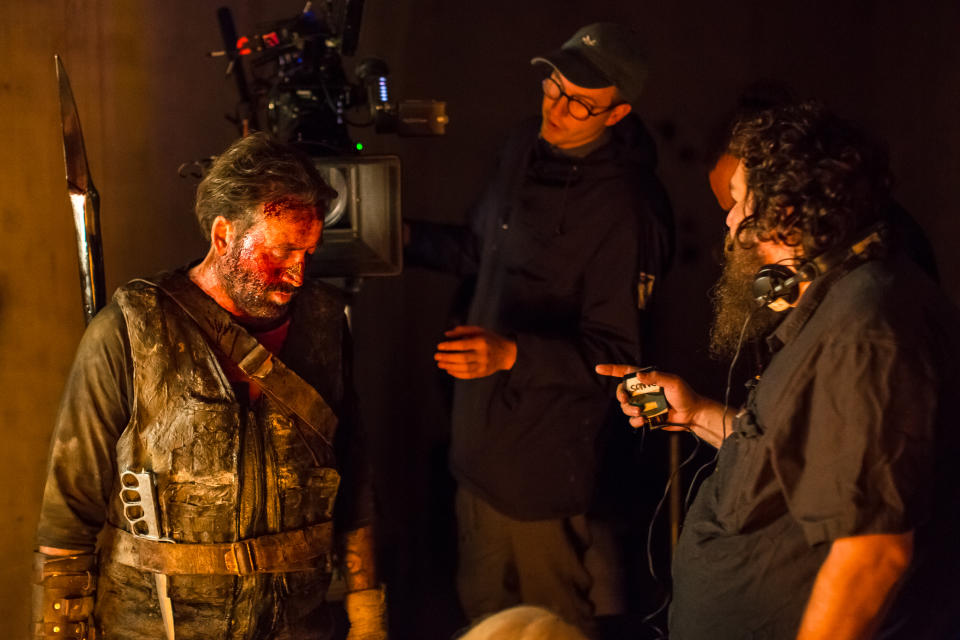
In terms of the audience response – when I first watched it it felt like this film was made specifically for me, and I hoped that other people would connect with it, and they really have. It’s such a unique, specific movie, what do you think the secret to its success is?
A lot of what has driven me with these two films, I wanted to make things that I wanted to see that I felt like other people weren’t making. Other people are making revenge movies and science-fiction horror movies, but it’s how it’s about it, not what it’s about. It’s this very specific fetishistic presentation of these things, with a personal undercurrent.
When I’m creating them I feel like I’m making them with my friends, and in the back of my mind – especially with Mandy – that there was an audience for this that wasn’t really being spoken to, and it turns out maybe that’s the case. Some of it is very true to me, and I was hoping that would resonate with other people.
Is there anything noticeably different in the way British actors approach their craft?
Every actor is different. Andrea Riseborough’s approach is very emotionally driven, putting herself into a state of mind where she feels she’s resonating with the material. Linus is more of a theatre actor who studies the material in a more pragmatic way, perhaps. These three actors all approached it in a slightly different way, but it was a joy to work with all three of them.
You mentioned to me last night a potential idea for Mandy 2, are sequels something that’s in your wheelhouse, or…
I love sequels, personally. But I miss the ‘80s version of a sequel, how they could have a radically different tone to the previous one. Now everything feels like another episode of a television show, it’s aesthetically the same and tonally the same and feels very wrote and manufactured.
I like the idea of making sequels that are radically different to the originals. I like the fact that Evil Dead II is essentially a remake of Evil Dead, but faster and more intense.
We also talked about your love of Kerrang last night, what other elements of British culture are you a fan of?
Matchbox [laughs] and Corgi, no, I really love England, I feel really at home here. I feel like I’m wasting my life by not living here. I really like the old Doctor Who and some of the weirder ‘70s British TV series.
Would you ever guest-direct an episode?
Yeah, sure. I don’t have an encyclopedic knowledge of Doctor Who, but there was an episode I saw when I was a kid, where Doctor Who was in this castle and he was peering through this weird portal and he saw a man wearing a suit of armour, and he had a helmet shaped like a thimble, and he lifted it off and his head was bald and shaped like the helmet on the inside – like a thumb! This thing haunts me, man, thumbhead!
The Sontarans, maybe?
That sounds right. But also, 2000AD and stuff like that was huge for me, Judge Dredd really changed my life.
Is that something that potentially interests you?
Possibly. I’m not sure yet. Duncan Jones is about to do Rogue Trooper, we’ll see.
Mandy is out in UK cinemas October 12 and out on Blu-Ray® DVD and Digital Download October 29.
Read more
Nic Cage says R rated Ghost Rider would’ve been ‘enormously successful’
13 actors who played more than one role in a single movie
Nic Cage to call it quits with acting in ‘three or four’ years

 Yahoo Movies
Yahoo Movies 

